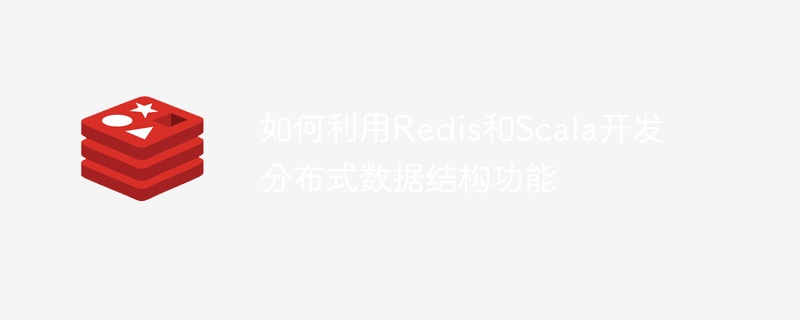
How to use Redis and Scala to develop distributed data structure functions
Overview:
With the expansion of the scale of the Internet and the increase in application scenarios, for distributed systems The demand is also growing day by day. Redis is an open source in-memory database with high performance, high availability and distributed functions, so it is widely used to build distributed systems. Scala is a powerful programming language that combines the characteristics of object-oriented programming and functional programming, making it easier for developers to use Redis to build distributed data structures.
1. Redis distributed data structure
Redis provides some distributed data structures, including ordered set (sorted set), list (list), set (set), and hash table (hash) And string (string), etc. These data structures are designed for distributed storage and operation, allowing data storage and access between multiple Redis nodes.
2. Integration of Scala and Redis
Scala is a language that is highly compatible with Java, so it can be easily integrated with Redis. Developers can use Scala's Redis client library to connect to and operate the Redis database. Commonly used Scala Redis client tools include Redis Scala, Rediscala, ScalaRedis, etc. The following is sample code for using the ScalaRedis library to connect and operate Redis:
3. Use Redis and Scala to develop distributed data structure functions
The following takes ordered set (sorted set) as an example to introduce how to use Redis and Scala to develop distributed data structures. Function. An ordered set is a set provided by Redis that is sorted by score value, and its internal members are unique.
Through the above steps, we can use Redis and Scala to create and operate distributed ordered set data structures in a distributed environment.
4. Summary
Using Redis and Scala can easily develop distributed data structure functions. Redis provides distributed data structures, and Scala provides integration support with Redis. By using the Scala client library for Redis, developers can simply connect to and operate the Redis database. The above example takes an ordered collection as an example to demonstrate the use of Redis and Scala to develop distributed data structure functions. I hope the above content will be helpful to everyone on how to use Redis and Scala to develop distributed data structure functions.
The above is the detailed content of How to develop distributed data structure functions using Redis and Scala. For more information, please follow other related articles on the PHP Chinese website!
 Commonly used database software
Commonly used database software
 What are the in-memory databases?
What are the in-memory databases?
 Which one has faster reading speed, mongodb or redis?
Which one has faster reading speed, mongodb or redis?
 How to use redis as a cache server
How to use redis as a cache server
 How redis solves data consistency
How redis solves data consistency
 How do mysql and redis ensure double-write consistency?
How do mysql and redis ensure double-write consistency?
 What data does redis cache generally store?
What data does redis cache generally store?
 What are the 8 data types of redis
What are the 8 data types of redis




